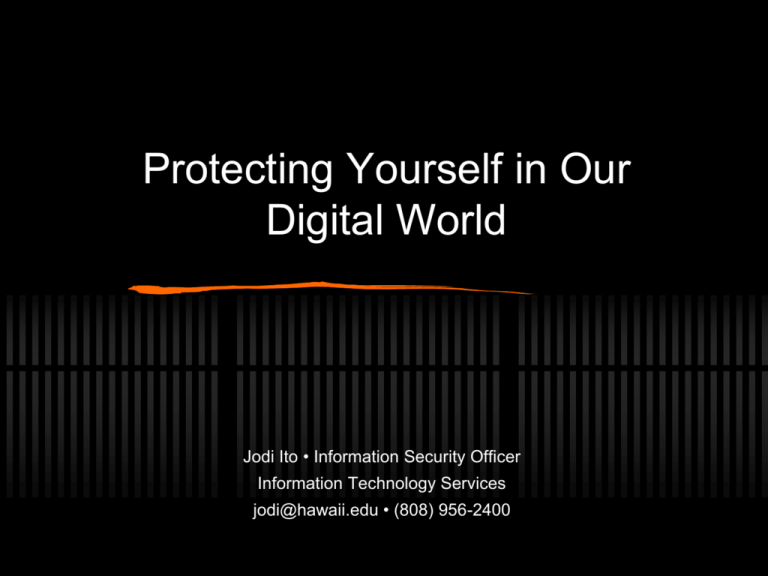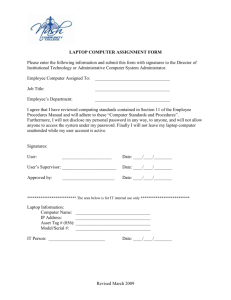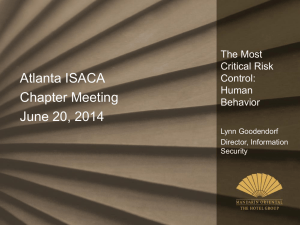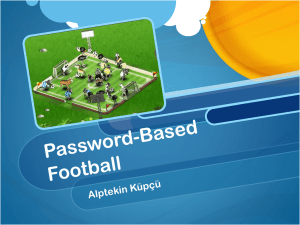Top IT Security Threats: 1 of 3: Data Leakage
advertisement

Protecting Yourself in Our Digital World Jodi Ito • Information Security Officer Information Technology Services jodi@hawaii.edu • (808) 956-2400 From Our President QuickTime™ and a decompressor are needed to see this picture. 2 Today’s Thoughts Our Digital World Today Threats and Vulnerabilities Mitigation Strategies Security Awareness 3 Today’s Environment 4 has become a verb! Technologies and Trends INFORMATION AGE! NOW Generation PDAs, laptops, netbooks + (wireless networks/cellular broadband) = Mobile Computing Cellphones --> Smartphones “Texting”, “Tweeting”, “Friending” --> Social Networking WHOLE NEW WORLD! 6 Sign of Things to Come… http://www.informationweek.com/news/s howArticle.jhtml?articleID=219100621 7 Fun, Convenience, OR….? Toy car lets kids spy on others http://www.networkworld.com/video/?bcpid=60965047001&bclid=1363192037&bctid=681722120 01 Using mobile devices to open hotel doors http://www.tnooz.com/2010/03/01/mobile/hotel-door-opening-technology-moving-to-mobiledevices/ 8 QuickTime™ and a H.264 decompressor are needed to see this picture. 9 FTC P2P data leak alarm… The Federal Trade Commission this week sent letters to almost 100 organizations that personal information, including sensitive data about customers and employees, has been shared from their computer networks and is available on peer-to-peer (P2P) file-sharing networks to any users of those networks, who could use it to commit identity theft or fraud. Search for “FTC P2P data leak” using your favorite search engine 10 More P2P Filesharing Risks… “P2P Snoopers Know What's In Your Wallet” http://www.networkworld.com/news/2010/020710shmoocon-p2p-snoopers-know-whats.html “File Sharers, Beware!” http://www.cbsnews.com/stories/2005/05/03/eveningn ews/main692765.shtml 11 Digital Threats Viruses, Spyware, Trojans & Other Malicious Software Botnets Phishing & Spam Identity Theft Cyber Stalking, Cyber Bullying, Online Predators Etc., etc., etc…. 12 Form Phishing North Carolina State University Phishing Attack “Security” email directed recipients to web site to “protect” their accounts Phishers used NCSU graphics to replicate phishing web page http://www.ncsu.edu/it/security/webmailphishing.html 13 Anti-Phishing Phil http://wombatsecurity.com/antiphishingphil 14 Useful Information Federal Trade Commission http://www.onguardonline.gov/ Department of Homeland Security www.staysafeonline.org 15 Tapping Your Cell Phone http://www.wthr.com/Global/story.asp?s=9346833 QuickTime™ and a decompressor are needed to see this picture. 16 Booming Cyber Crime Industry! Botnets: Rent-a-botnet SPAM generators (steal email accounts and passwords) $$$ - Stolen sensitive information Top 3 categories: Bank account - £5 ($8) Credit cards - 50 credit cards for £20 ($35) Personal identities - EU identities are worth more 17 Underground Economy Multi-Billion $$$ industry TJX Data Breach: Estimated 94 million victims Estimated losses: $65M - $83M August 2008: Hacker ring charged with conspiracy, computer intrusion, fraud, & identity theft: http://www.consumeraffairs.com/news04/2008/08/hacker_ring.html 18 Background Resources “Botnet probe turns up 70G bytes of personal, financial data” estimated worth $8.3M http://www.networkworld.com/news/2009/05 0409-botnet-probe-turns-up-70g.html UCSB Computer Science Study: http://www.cs.ucsb.edu/~seclab/projects/torp ig/index.html 19 Data Breaches Privacy Rights Clearinghouse http://www.privacyrights.org/ar/ChronDataBreaches.ht m#CP Over 260 millions records containing sensitive information are involved in security breaches Educational Security Incidents: http://www.adamdodge.com/esi/ 20 Example 21 This Cyber “stuff”… Affects us all! Each unprotected/unpatched computer is a threat: Infected worm/virus/bot Could be used in a concerted attack against a critical infrastructure Computers, servers, mobile storage devices with any sensitive information represent a vulnerability 22 What Do We Do? Practice safe computing! 23 Keep Your Computers Safe Update the software on your computer weekly (or more frequently) Install anti-virus and anti-spyware software and keep it up-to-date Use accounts and strong passwords Encrypt sensitive information http://www.hawaii.edu/askus/729 Don’t install unknown software from unknown sites Don’t share your accounts/passwords Use password protected screen savers 24 Use STRONG Passwords Not easily guessable Do not use dictionary words Use a combination of upper and lowercase letters, numbers, and special characters No less than 8 characters Check your password strength: https://www.microsoft.com/protect/fraud/passwords/checker.aspx 25 Password Strategies Replace letters with numbers or characters Incorporate something memorable to you Example: need password for CitiBank online account got your mortgage in April 2005: 04C7t7B@nk05 Use a phrase and turn it into a password Example: My Favorite Food is Chocolate Ice Cream MfFiCiC2010m@r 26 More on Passwords Don’t use the same password for all accounts Change passwords frequently Use more difficult passwords on more sensitive accounts Use a password safe (but don’t lose the master password!) http://passwordsafe.sourceforge.net/ http://www.hawaii.edu/askus/705 27 Protect Yourself and Information Don’t open unknown emails & attachments Visit only reputable web sites http://safeweb.norton.com/ Do not reply to SPAM or Phishing emails Only login to servers for the duration needed disconnect when done Don’t let others use your computer irresponsibly Use a credit card for online shopping http://www.hawaii.edu/askus/729 28 DO NOT EVER… …Give out your personal information in response to an UNSOLICTED email, phone call, voice mail If in doubt, CHECK IT OUT! Call the company using another legitimate phone number (not the one provided in the email or phone call) New scams use social networking sites to get background personal information 29 Protect Your Sensitive Information BE SUSPICIOUS! You can’t take back information you’ve already given out Ask “Why?” when someone asks for your SSN Check your credit report: www.annualcreditreport.com 30 Social Networking Do not post TOO MUCH INFORMATION! Internet is FOREVER! Whatever you post may circulate even AFTER you delete it New scams use social networking sites to get background personal information Watch what your children do on the computer 31 TTMI… Tweeting Too Much Information: http://pleaserobme.com/ 32 Laptops and Mobile Devices Implement passwords on the device Backup your data frequently & test backups Store backups away from the laptop Encrypt sensitive information Watch your laptop at all times Keep your laptop in your possession at all times Don’t leave it out in your hotel room Consider using a laptop lock Consider laptop recovery services Don’t leave your laptop in a car 33 Wireless & Public Computers Be cautious when using open wireless networks Others using the network maybe be “sniffing” the network If you must use a public computer, change the password on the account accessed using a secure computer ASAP 34 Wi-Fi Dangers… Security Expert Claims Thieves Can Detect Wi-Fi In Sleeping Computers http://www.wired.com/gadgetlab/2010/03/securit y-expert-claims-thieves-can-detect-wi-fi-insleeping-computers/#ixzz0hKGscGjt Hidden dangers of free public WiFi http://news.zdnet.com/2100-1035_22149778.html 35 BE AWARE! Know what’s out there (Google yourself) Questions? Jodi Ito jodi@hawaii.edu (808) 956-2400



